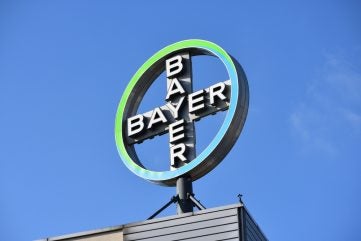
The US Food and Drug Administration (FDA) has granted breakthrough therapy designation to Bayer for its non-small cell lung cancer (NSCLC) candidate BAY 2927088.
BAY 2927088 is a reversible tyrosine kinase inhibitor (TKI) that selectively inhibits mutant forms of HER2 and EGFR. The orally administered drug, which was designed in collaboration with the Broad Institute of MIT and Harvard, is indicated for the treatment of adults with unresectable or metastatic NSCLC with human epidermal growth factor receptor (HER2) mutations who have not responded to at least one prior systemic therapy.

Discover B2B Marketing That Performs
Combine business intelligence and editorial excellence to reach engaged professionals across 36 leading media platforms.
Bayer is now eligible to receive fast track benefits and added guidance from the agency for the drug’s development plan, as per breakthrough therapy benefits.
The FDA based its decision on data from Bayer’s Phase I/II trial (NCT05099172) evaluating the treatment in adults with NSCLC who have mutations in one or both the HER2 gene and the epidermal growth factor receptor (EGFR), according to a 26 February press release.
The trial is estimated to enrol 460 participants. Primary endpoints include assessments measuring safety, pharmacokinetics, and preliminary efficacy.
NSCLC is the most common type of lung cancer, causing around 135,000 deaths in 2021. The only FDA-approved therapy currently available for the HER2 mutation-associated form of the disease is Daiichi Sankyo and AstraZeneca’s Enhertu (fam-trastuzumab deruxtecan-nxki), a HER2-directed antibody and topoisomerase inhibitor conjugate. The drug gained accelerated approval in August 2022, though will need to demonstrate further positive results in confirmatory trials to gain traditional full approval.

US Tariffs are shifting - will you react or anticipate?
Don’t let policy changes catch you off guard. Stay proactive with real-time data and expert analysis.
By GlobalData“Early clinical evidence suggests that BAY 2927088, our investigational novel oral tyrosine kinase inhibitor, has the potential to benefit patients with NSCLC harbouring a HER2 mutation that has progressed on a prior systemic therapy,” said Dominik Ruettinger, Bayer’s head of research and early development for oncology.
Across 15 global markets, the NSCLC market is predicted to surpass $45.4bn in total by 2031, according to a report by GlobalData. The market is largely dominated by MSD’s Keytruda (pembrolizumab), which saw $25bn in global sales last year.
GlobalData is the parent company of Pharmaceutical Technology.




